Japan doesn’t want the U.S. to apologize for bombing Hiroshima. Here’s why
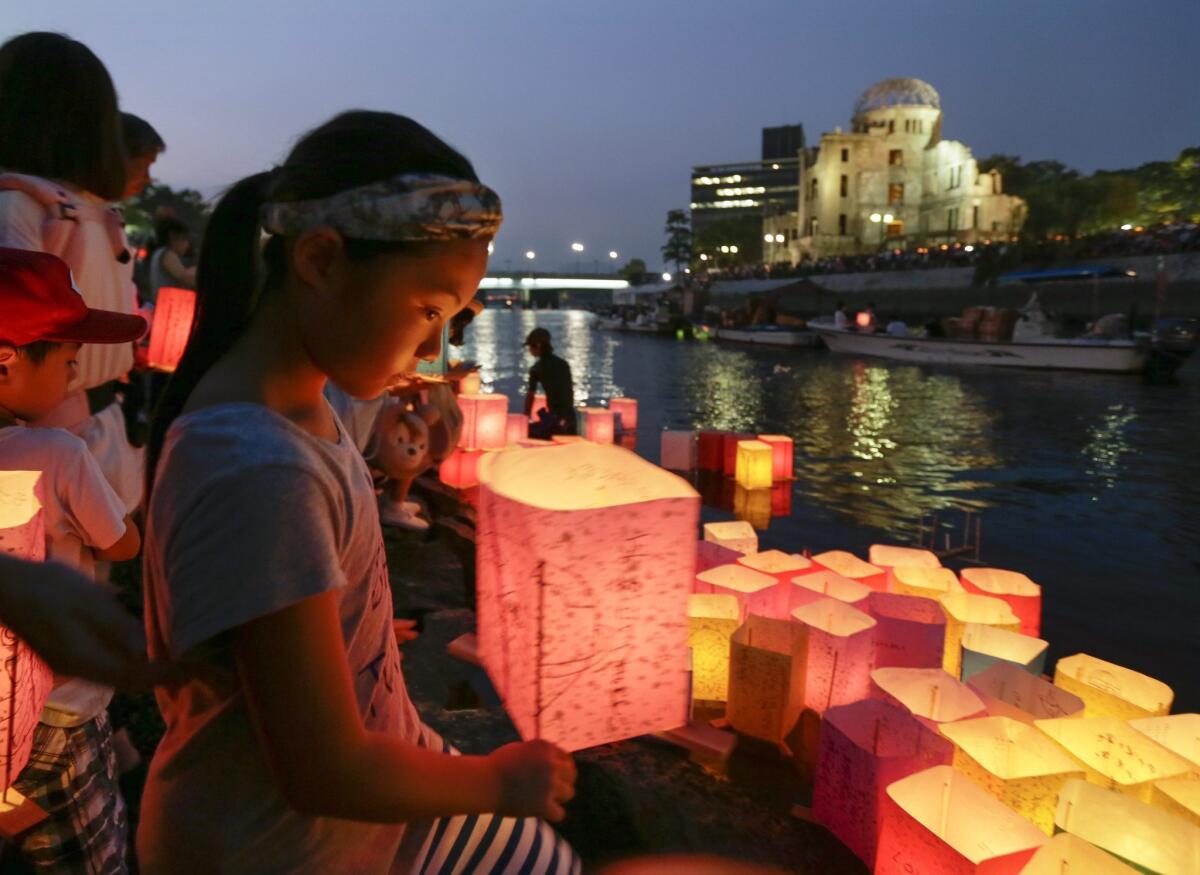
A girl floats a paper lantern on the Motoyasu River to comfort souls of victims killed by the atomic bombing at Hiroshima.
- Share via
Reporting from TOKYO — For years, the question has lingered: Should the U.S. apologize for dropping the atomic bomb on Hiroshima?
The opportunity could present itself if President Obama visits the city while attending the G7 Summit in Japan next month. No sitting U.S. president has visited the city since it was largely destroyed in an atomic blast during World War II.
Secretary of State John Kerry may have foreshadowed what’s to come when he visited Hiroshima this month and called the experience “gut-wrenching.” Yet he stopped short of offering an apology to his hosts.
Apologizing for a wartime act generations ago would be as welcome to Japanese political leaders as a cloud of mosquitoes. Here’s why:
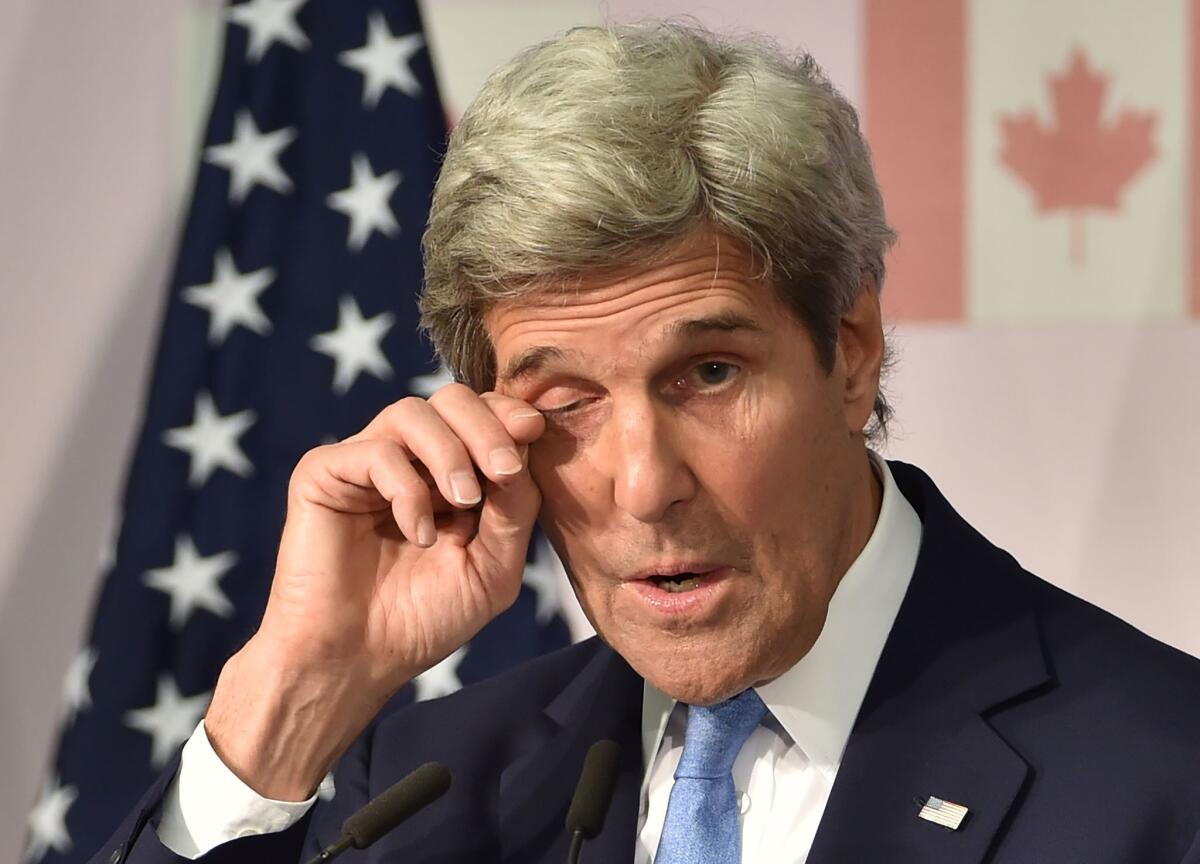
U.S. Secretary of State John Kerry appears at a news conference following the G7 Foreign Ministers’ Meeting in Hiroshima.
Does Japan even want an apology?
Likely not. A secret 2009 state department cable published by Wikileaks in 2011 indicated Japan was cool to the idea and worried that it would only serve to energize anti-nuclear activists in the country.
Hasn’t this come up before?
It has. In 2007, during Shinzo Abe’s first term as prime minister, Defense Minister Fumio Kyuma referred to the bombing of Hiroshima and Nagasaki as “something that couldn’t be helped.” While opposition leaders took issue with that position, the government’s official stance was that it would be more meaningful for the U.S. and Japan to “aim for a peaceful and safe world without nuclear weapons.”
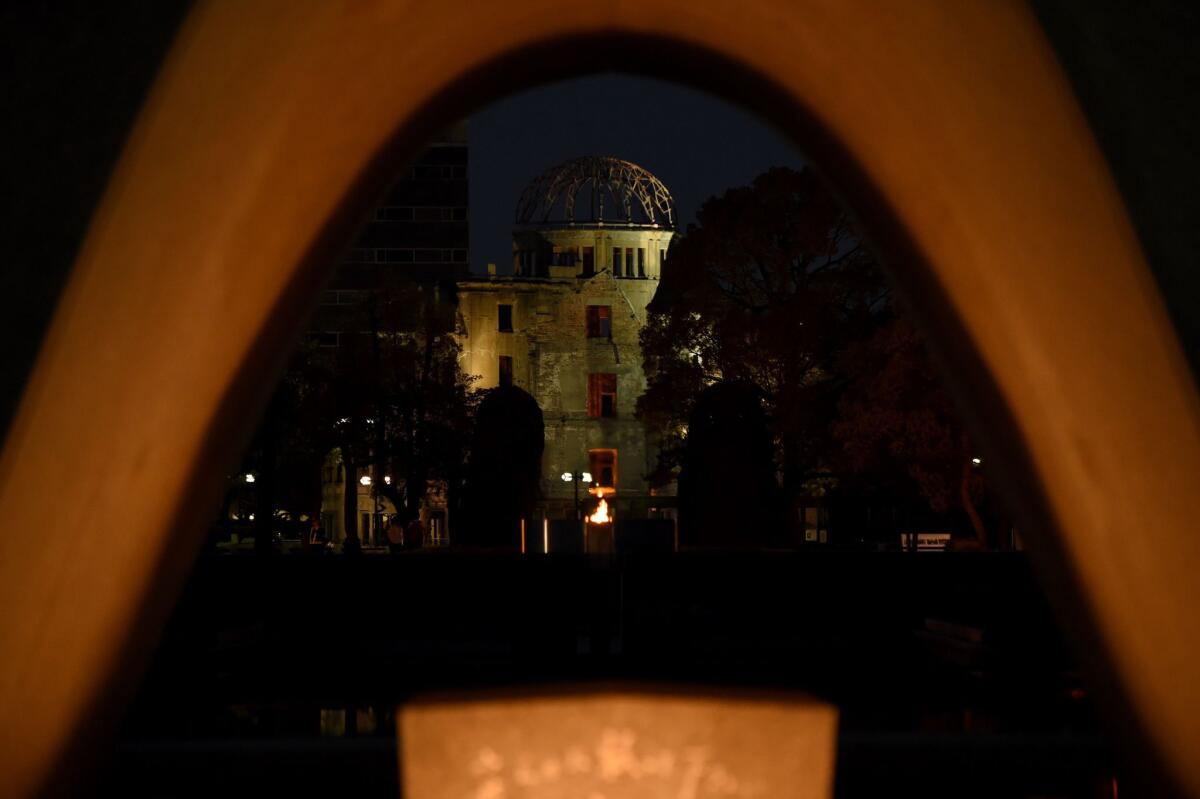
The atomic bomb dome is seen through the altar of Hiroshima Peace Memorial Park.
An apology could trigger unneeded political fallout
Devin Stewart, a noted expert on Japan, and senior program director at the Carnegie Council for Ethics in International Affairs, suggests that an apology could “open a can of worms on many, many issues.”
There’s concern, for instance, it might undermine Abe’s initiative to give Japan a more nimble, capable military and clear the way for troops to fight overseas, something that hasn’t happened since the end of World War II. Abe’s primary goal, Stewart says, is to strengthen the military and everything else, including his economic platform of Abenomics, is a means to achieve that goal.
An apology also could harden the opposition to using nuclear power in Japan, a sentiment that blossomed after the meltdown at Fukushima. The administration has made nuclear power a major part of its energy policy.
“Overemphasizing the inhuman nature of the nuclear weapons used on Hiroshima and Nagasaki goes against what the current government of Japan has been working on so hard for decades — removing ‘allergic’ reaction against nuclear weapons and nuclear power. In short, let the sleeping dogs lie,” Koichi Nakano, a professor of Japanese politics at Sophia University, said.
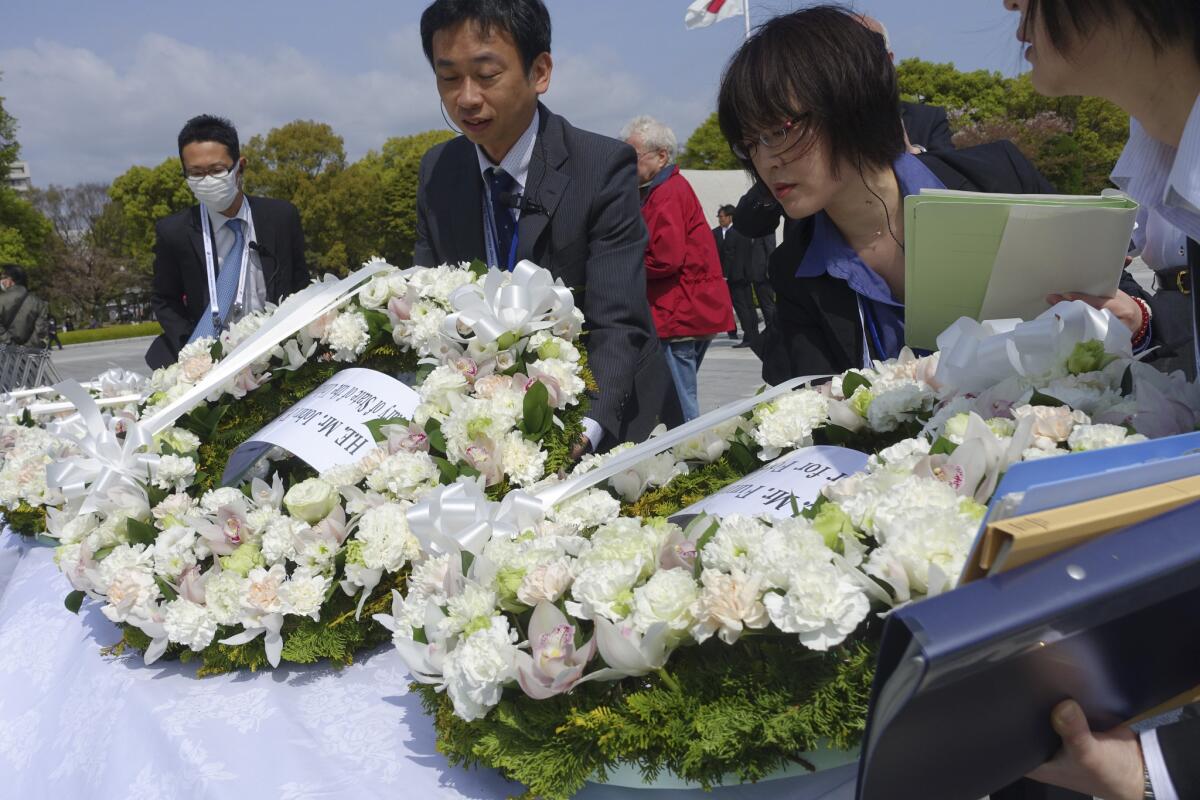
Officials place wreaths as they prepare for a visit by the Group of Seven foreign ministers at the Hiroshima Peace Memorial Park in Hiroshima.
It could set off a chain reaction of apologies
Prime Minister Abe’s speech on the 70th anniversary of the end of World War II was a classic non-apology apology, and this administration allegedly hates to apologize.
“Why doesn’t the Japanese government want Mr. Obama to apologize? Because it tears the scab off a much bigger wound that Japan wants healed,” says Grant Newsham, a senior research fellow with Japan Forum for Strategic Studies and former U.S. diplomat with over 20 years’ experience in Japan.
“If Obama apologizes at Hiroshima, it draws attention to Japanese behavior elsewhere in Asia during the ’30s and ’40s. It might even be demanded that the Japanese government and emperor go to Singapore and apologize for slaughtering 25,000 Chinese there in 1942. Or to Australia to apologize for how they treated their POWs. Or to the Philippines (to apologize) for a few hundred thousand murders by the Imperial Japanese Army as well.”
See the most-read stories this hour >>
Beyond launching a new round of hand-wringing over wartime atrocities, Nakano says an Obama apology could raise fresh questions about Japan’s own attempts to build an atomic bomb.
Even the right wing journalist and ultra-nationalist Hiroyuki Fujita says that an apology is “not necessary and I don’t think the Japanese people want it. It will create “a ceaseless round of apologies.
“However, I think the American people should know that not only the bombing of Hiroshima and Nagasaki, but the firebombing of Tokyo in which thousands died, were illegal acts against humanity. They were civilian massacres.”
What about the survivors in Hiroshima?
The survivors — those who remain — are largely out of sight and out of mind, and there’s little political capital in digging up memories of the bombing, Stewart notes.
“Many people in the center of power in Tokyo would rather not talk about such touchy issues,” he says.
The Japanese government has long fought to limit the number of people seeking official recognition as atomic-bomb survivors eligible for special assistance, and survivors who feel they suffered from radiation exposure but weren’t recognized as victims have filed numerous lawsuits. When Abe was prime minister from 2006 to 2007, he refused to meet with the plaintiffs.
Last year, in a break from tradition, Abe failed to include a pledge to observe the country’s three nonnuclear principles in the annual Hiroshima Peace Memorial Ceremony speech.
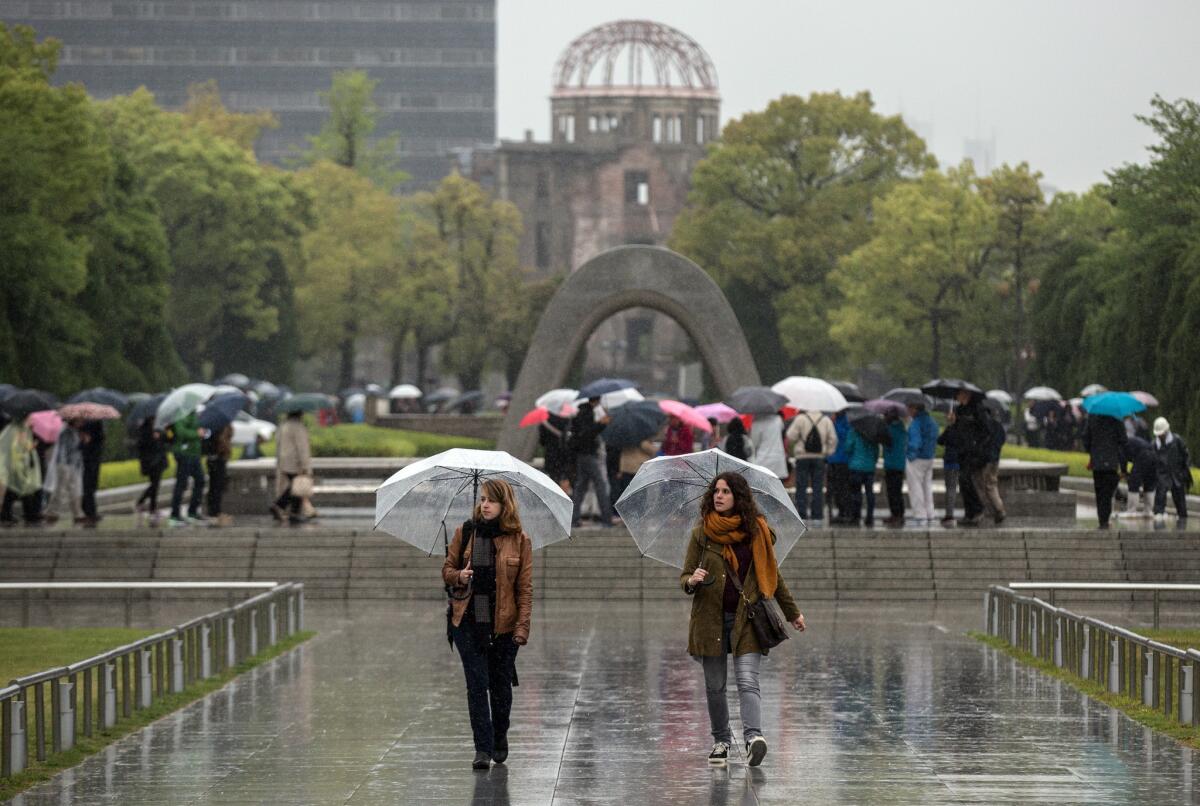
Tourists visit the Memorial Park, Atomic Bomb Dome and the nearby Hiroshima Peace Memorial Museum.
What does the public think?
A 2015 opinion poll by a Russian news agency found that 60% of the Japanese public wanted an apology for the bombing.
But what the Japanese government and the public want aren’t always the same.
Adelstein is a special correspondent.
ALSO
Pentagon modifies training and targeting after deadly U.S. attack on hospital
An islet the size of your bedroom has Japan and Taiwan fighting
North Korea sentences American to 10 years of hard labor on spying charges
More to Read
Sign up for Essential California
The most important California stories and recommendations in your inbox every morning.
You may occasionally receive promotional content from the Los Angeles Times.










